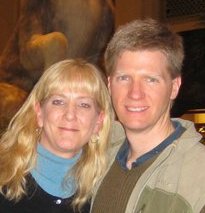Sisters
Permanent link All PostsIn many ways my older sister and I are perfect opposites.
Almost seven years divide us, enough time between so that even our childhood cultural references differ. She watched different shows, wore different fashions, and listened to different music.
What time couldn’t make different, our genes and parents did. She got the 20/20 vision, blue eyes and tall, slender frame. I got the coke-bottle frames, brown eyes, and drew the short and squat card. (But hey, I’m still 6 ½ year younger!)


Me and my sister (she with her hubby)—can you see a resemblance?
Throughout high school and college, she was given the role of the black sheep in the family while I played the nerd. She loves the great outdoors; I hate nature. She stays at home with her two children; I work full-time. She has the sensitive soul of a writer; I have the thick skin of a business major.
She is a devout Christian with “Jesus in her heart”; I’m a Jew.
It’s not easy to have a sibling you most likely wouldn’t be friends with were it not for your blood. And for a long while, we weren’t even friends.
You know the book (and subsequent movie) In Her Shoes—a story about two sisters very different from one another? It could have been written about my sister and me—right down to the growing up in Philadelphia part (but stopping short of sleeping with my boyfriend. Ick.)

When you have very little in common with your sibling, it means that if you want a relationship with her, you have to work at it. You have to try to understand and respect different perspectives, and learn how to ask for and give forgiveness. It means challenging yourself to look beyond who you think your sibling is, to who she really might be. What you find might surprise you—people can and do change.
And sometimes you simply have to put up with shit that you would not take from anyone else.
There have been truly challenging moments when I’ve been seriously tempted to break all ties with my sister. The time she refused to have her daughters participate in my wedding—not wanting to “confuse” them by exposing them to Judaism at a young age—comes to mind.
And then I think about how I could ever explain to my daughter why she has an aunt she never sees, cousins she has never gotten to know. And I ask myself: do I really want to have a sibling that I never speak to?
So I pick up the phone and call and say it’s OK when it’s not, just to keep the peace.
That experience taught me that tolerance and acceptance are two different things. And sometimes all you can expect from someone—even family—who has vastly different beliefs than you is tolerance.
Over the last few years, my sister and I have found common ground as wives and mothers. I can call her for advice when my child is sick, and she can call me she needs to talk to an adult.
We’ve both learned to let go of past hurts and move forward because we simply need each other. Only we know what it’s like to be Don and Joanne’s kids. We will always get each other’s inside jokes about our crazy family. And when my parents age and someday pass away, I expect we will cry on each other’s shoulders—even if we dispute how to handle the estate. (Sis—Dad’s collection is all yours. I insist.)
Being related to someone by blood isn’t enough to make them family. But I’ve seen many estranged families, and so often the hurt and pain of estrangement is far worse than what caused the breach. So I’ve learned that while breaking ties might be the easier road, it isn’t always the right one.
I can’t predict the future of my relationship with my sister, but I hope that we continue to want and need each other in our lives. And that’s really all we need to have in common.



.jpg)



